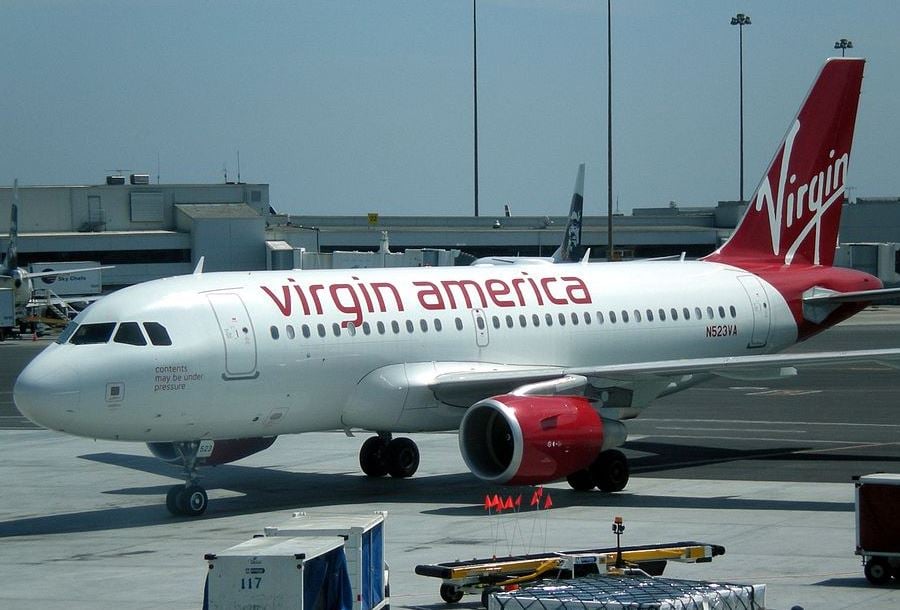Virgin America Inc. (NASDAQ: VA) set its price as $23 for its initial public offering (IPO) Friday morning. The proposed maximum offering price per share was $24, from a range of $21 to $24 per share. Over 13 million shares were registered, with an option for an additional 2 million. The total offering at $23 per share for more than 15 million shares is valued at $352.8 million. Source: Wikimedia Commons
Source: Wikimedia Commons
The underwriters for the offering are Barclays, Deutsche Bank, Bank of America Merrill Lynch, Cowen, Imperial Capital, LOYAL3 Securities, Goldman Sachs and Raymond James.
The Wall Street Journal reported:
PAR Investment Partners LP has agreed separately to purchase 2.3 million shares for about 96% of the IPO price, or about $50 million, from the controlling shareholders in a private placement. The IPO is expected to raise about $220 million in net proceeds, which Virgin America said it plans to use for working capital, sales and marketing and capital expenditures. Selling shareholders won’t receive any proceeds.
ALSO READ: 10 Brands That Will Disappear in 2015
This IPO comes at a time where the airline industry is soaring, and 24/7 Wall St noted earlier that falling oil prices over the past month have made a huge contribution to major airline stock prices. The impact of lower oil prices and the continued strong consumer demand almost certainly add support to the bottom line. The logic behind the massive gains in airline shares is that as oil costs shrink, airlines should see their margins increase and earnings grow from there.
Oil prices were reaching 52-week highs in late June and early July of 2014. This level was over the $100 barrel mark at $102.53. Since that time, the price of oil had plummeted to a multiyear low of $73.22, and there seems to be no clear bottom in sight, as oil continues to slide lower.
Virgin America is Sir Richard Branson’s U.S. domiciled airline, based in California, that provides scheduled air travel in the continental United States and Mexico. Los Angeles and San Francisco act as its focus cities to other major business and leisure destinations in North America. At the end of September 2014, Virgin provided service to 21 airports in the United States and Mexico with a fleet of 53 narrow-body aircraft. This fleet is also one of the youngest among U.S. airlines, comprised entirely of fuel-efficient Airbus A320-family aircraft.
For 2013, Virgin posted operating revenues of $1.4 billion and operating income of $80.9 million with net income of $10.1 million. In 2013, the company increased revenue per available seat mile by 9.3% compared to 2012, the largest increase of any major U.S. airline. There was a recapitalization of a majority of the operating lease and debt obligations in May 2013, which contributed to a $34.7 million decline in aircraft rent expense and a $44.8 million decline in interest expense in 2013 compared to 2012. As a result, financial performance improved to net income of $10.1 million in 2013 from a net loss of $145.4 million in 2012. In the first nine months of 2014, the company had net income of $56.2 million, compared to a net loss of $4.0 million in the first nine months of 2013.
ALSO READ: 5 Top Inexpensive and Neglected Blue Chip Stocks to Buy
Sponsored: Attention Savvy Investors: Speak to 3 Financial Experts – FREE
Ever wanted an extra set of eyes on an investment you’re considering? Now you can speak with up to 3 financial experts in your area for FREE. By simply
clicking here you can begin to match with financial professionals who can help guide you through the financial decisions you’re making. And the best part? The first conversation with them is free.
Click here to match with up to 3 financial pros who would be excited to help you make financial decisions.
Thank you for reading! Have some feedback for us?
Contact the 24/7 Wall St. editorial team.



